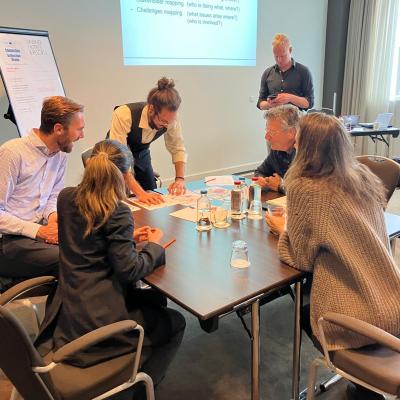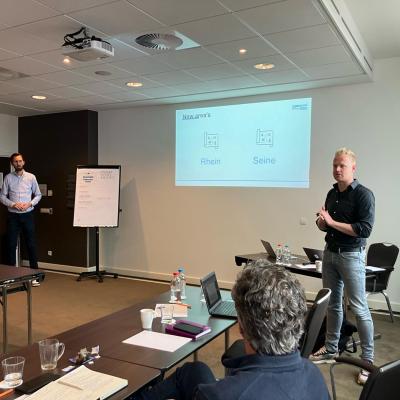Following an interesting launch meeting in November 2023, the Connection and Reflection Group met again, this time in Antwerp during the Consortium Group meeting of the Connected River Project in October 2024.
The Connection and Reflection Group (CRG) is a strategic body for the Connected River Project, it is made of external partners that wish to get involved in the project and benefit from its experimentations. The members of the CRG give feedback on the efforts made so far but also get inspired by the experimentations of the different pilot areas and think about ways to integrate the methodologies of the Flow Forward method in their own context. It is also a space for integrating an academic geographical perspective and analysis.
It is chaired by Carola Hein, professor at TU Delft and AIVP expert on port cities. The CRG meetings are organized by Noémi Mené from the project partner AIVP.
One of the Connected River project partners, Ruud Kosman from Innovalor Advies, presented the update of the project and the Flow Forward method. Project partners from the Pilot areas of Amsterdam, Jelmer de Lange and Nijmegen, Sander Wegbrans presented more specifically their experimentation.
Following this, a workshop was organized by two researchers from PortCitiesFutures/TU Delft, Léa Kayrouz and Matteo D’agostino. This time, the focus was on two cases, to analyse them spatially and socially as a network of stakeholders and where the group tried to foresee how the local stakeholders could apply the Flow Forward methodology. They studied more specifically the case of the Seine river and the Rhine ecosystem on the portion going from Nijmegen to Duisburg.
Identified Key Challenges
- In the case of the Seine: water management (quality and quantity), complex set of concurrent uses and responsibilities around the river.
- In the case of the Rhine: the transboundary nature of this section of the river, which complicates water management (using water for shipping vs for drinking, dealing with floods), as well as the role of a major crossroads for European inland transportation.
Some similarities were found between the two cases and how an agile innovation method could help face those complex challenges.
Representatives from the City of Paris, Voies Navigables de France (French waterways), EIT Urban Mobility, HAROPA Port, Waag Futurelab and Rijkswaterstaat were present at this meeting.
The next meeting will take place in spring in Nijmegen (Netherlands), where the groups wished to continue the work on the two cases and see how they could apply the Flow Forward method more specifically.
Below you can find the main outcomes of the discussion and maps that were used.
You wish to get involved or receive more information?
Please contact Noémi Mené (nmene@aivp.org).
Source & Pictures: AIVP


